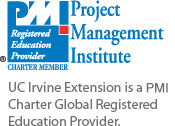| Required Courses |
Introduction to Project Management Principles and Practices
View Description
Project management has been proven to be the most effective method of delivering products within cost, schedule, and resource constraints.
Gain a working knowledge of the basics of project management that can be instantly applied to any project.
This course will provide the skills to ensure your projects deliver on time and on budget.
Learn to define and manage scope via the elicitation of requirements and the creation of a detailed work breakdown structure, create a defensible and realistic project schedule and budget, develop and manage the project team, identify and manage risks, and understand the project procurement
processes.
|
Management, Leadership and Team Building in the Project Environment
View Description
The success of projects is dependent upon people and how effectively they work and communicate with one another.
You will reflect upon your role as a manager/ leader within a project management framework.
Explore concepts of human behavior, motivation, problem solving, decision-making, influence, conflict management, and organization structure.
Build skills in recognizing and managing project stakeholders, communications, team development, and working with virtual team members, via presentations, case studies, readings, essays, and discussions.
|
Project Procurement Management
View Description
Procurement management has become a vital project management skill, as organizations increasingly outsource all but their core competencies.
Understand the scope of procurement management in the contemporary project management environment and the role and responsibility of the procurement manager.
Learn to establish project scope, develop a procurement management plan, select the proper contract type, define strategic teaming agreements, evaluate and select suppliers, and track supplier performance.
|
Project Risk Management
View Description
Project success is achieved by project managers and teams skilled in coping with project risks.
Making good decisions and using proven processes requires both training and experience.
Gain in-depth practice applying subjective and quantitative methods to an actual project situation.
Learn from peers through risk analysis exercises, case studies, and persuasive presentations.
Discover how to recognize, assess, and respond to project risks in an appropriate, cost effective manner in order to make better decisions.
|
Project Monitoring & Control with Earned Value
View Description
Bringing together Project Monitoring and Control with Earned Value techniques, PMC with Earned Value will present you with a variety of tools and processes for ensuring adequate project controls including: scope, risk, procurement, cost, quality and schedule within the
costs or Performance Measurement Baseline (PMB).
Project managers will learn to make informed and fact based decisions derived from established and insightful project controls such as necessary immediate project decisions or corrective actions during the project execution phase.
Output and analysis of a variety of project monitoring and control techniques will equip you to make quick and sound project decisions, aiding your project(s) and enterprise.
This course will also introduce you to the principles of Earned Value Project Management including defining and establishing project scope, schedule and cost in order to align with executive management expectations.
Learn to use the earned value method to establish a realistic project baseline, calculate a range of estimates-at-completion (EAC), and apply effective methods for keeping your project budget and schedule on target.
Develop the strategies to effectively monitor, measure, and control costs and schedule.
Set project standards and metrics to measure project success and forecast results.
|
Project Management Practicum and Project Simulation
View Description
This hands-on capstone course lets you put into practice the five project process groups and the nine knowledge areas that are outlined in the Project Management Body of Knowledge Guide (PMBOK® Guide).
Participants will simulate a project based on one of two case studies.
The project will require students to create a complete project plan under typical business constraints.
Project managers are expected to team successfully with their classmates and to perform a variety of tasks typically required of project managers on the job.
|
| Elective Courses |
Project Stakeholder Management
View Description
Managing stakeholder expectations was a new addition to the PMBOK® Guide in 2012, but savvy project managers have always understood the need to keep stakeholder interests in mind.
This workshop will lay the groundwork for what you need to know to be ready to manage stakeholder expectations and will follow with tips and techniques to help your projects run more smoothly.
|
Managing Quality in the Project and Program Environment
View Description
An elective course in the Certificate Program in Project Management. In today's competitive environment, high quality is not an option, it is absolutely required as the price of entry to compete in the global marketplace.
Management in all industries are requiring that quality be an integral part of the project planning process and as a result, the traditional project manager now has to assume responsibility for the development and results of the project related quality programs.
This course focuses on the key issues related to managing project quality.
During this course, you will learn how the issue of quality is related to all aspects of your project from planning through implementation, and finally, the completion phase.
|
Project Management Tool Box
View Description
This project management boot camp will examine the basics of putting together a well-defined, planned, and executed project.
The goal is to deliver on time and on budget while meeting customer expectations.
Learn the basic components of project management and the project life cycle: project definition; practical and collaborative methods for creating a successful project charter or initiation document; building and managing a project team; perform risk analysis; and project closure.
Explore how to develop and lead high performance teams.
If you have never managed a project before, this class will give you an introduction and provide tools that you can use for your next project.
|
Managing Business Process Improvement Projects
View Description
Learn how the structured approach of business process improvement (BPI) can be performed at all levels in an organization.
Through a series of training activities, you will learn how to select, design, sell, implement, and institutionalize the changes necessary for effective BPI.
Determine the process flow of a project, evaluate ineffective use of time, and change the process for improved effectiveness.
In addition, collaborate on a class project that will allow for application of techniques to organization's processes and procedures.
|
Project Management Using MS Project
View Description
Learn the skills needed to enhance the outcomes of managing projects.
Gain knowledge of the fundamentals of project scheduling and the key area of knowledge for planning projects using Microsoft Project for Windows 2010.
This course will emphasize the importance of defining the total project with the use of a Work Breakdown Structure (WBS); then formally issuing and controlling the project with the use of a Project Master Schedule (PMS).
|
Advanced Project Management Techniques Using MS Project
View Description
Gain advanced skills and knowledge in building and managing complex projects using Microsoft Project for Windows 2010.
Review scheduling techniques and methods used to support Critical Path Method, the performance of Risk Analysis, and for the management of multiple projects in an integrated team environment.
Learn to identify and resolve common problems, use methods for debugging the schedule, and develop custom reports.
Study and apply techniques for the use of Earned Value method of performance measurement, tracking the progress of projects, resource loading methods, and advanced techniques for budget development.
|
Management of Multiple Projects
View Description
Managing multiple projects typically presents unique challenges compared to the management of one large project.
Build on your existing skills in the areas of scope, time, cost, risk, human resources, leadership and teambuilding through a combination of lecture and team-based learning exercises.
Learn to select the most effective strategies and responses for multiple, small independent projects, portfolios, or large programs.
Individual and group exercises will explore scheduling techniques and honing in on an assessment of project environments through stakeholder analysis.
An adaptable multi-project simulation will also reinforce the benefits of cooperation for mutual gain.
|
Creating the Program Management Office
View Description
Program management offices (PMOs) improve organizational performance in the management of projects, increasing capacity to optimize results from projects contemplated and underway.
Participants address six principal topics (modules) as they relate to assessing need, understanding current organizational requirements, designing, creating and maintaining a project or program management office: (1) the role of project based organizations, enterprise project management, and
program management offices,(2) urgency and coalition building, (3) vision and strategy, (4) implementation, (5) operating, and (6) maintaining effectiveness.
Explore a range of options for implementing change.
Receive feedback from others on what and how to take action through project offices.
|
Project Scheduling Concepts and Techniques
View Description
Gain the necessary concepts and techniques for project managers to develop sound basic scheduling skills.
A good schedule helps project managers to establish realistic goals to meet project objectives, enhance credibility, and better manage the clients' expectations.
Project managers must deliver results, meet requirements, and keep to agreed-upon time and cost constraints in order to ensure the success of their projects.
A high priority should be placed on skills for project estimating and scheduling, as well as negotiation and prioritization, in order to meet competitive demands and support other business objectives.
Learn to identify and use common scheduling and estimating terms and their correct definitions, and apply a wide range of scheduling techniques as referenced in the PMBOK® Guide, and other accepted sources.
|
Systems Project Management
View Description
Learn the benefits of combining traditional project management with a systems approach for an improved product development cycle focused on customer needs and reduced overall costs.
Ensure steady progress toward a project’s technical objectives through efficient use of financial and human resources, and timely completion of the project.
In this effective system all components interact harmoniously—encouraging systematic and repeatable planning, design, and implementation throughout.
|
Project Cost Management
View Description
No organization has unlimited time, money, or resources.
For that reason, cost management can be used to evaluate the benefits and expenses of the project in relation to other potential projects before a selection is made.
Learn to evaluate and analyze the financial viability and non-financial issues.
Review basic financial terms and concepts that influence project selection decisions and understand all aspects of project planning.
Discover how to prepare a cost estimate and budget in addition to considering ways how to monitor and control cost and manage changes to the cost baseline.
|
Advanced PMBOK® Guide Applications (PMP® Exam Preparation)
View Description
Review the knowledge areas in the PMBOK® Guide and the key concepts in Professional Responsibility.
Prepare to pass the PMP® Examination with a focus on understanding how to integrate the detailed project management processes.
To measure your preparedness for the exam, this course will provide exercises, practice questions, practice exams, and practical tips from Project Management Professionals®.
The content of this course is fully compliant and aligns with the Guide to the Project Management Body of Knowledge (PMBOK® Guide) - Fifth Edition.
|



